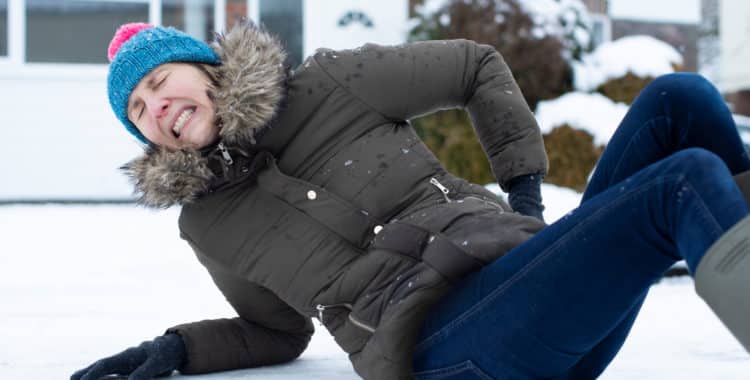Winter in Chicago: Why you need an expert slip and fall lawyer
While winter weather may bring some chilly temperatures to otherwise-temperate regions across the United States, few places can compare to winter in Chicago. From polar vortexes to bitter wind blowing snow and sleet, the Windy City can become one big ice rink, which is why having an expert Chicago slip and fall lawyer at your disposal is a smart decision.
While most slip and fall accidents results in a few bumps and bruises, some can lead to broken bones, damaged soft tissue, large wounds and concussions — injuries that require expensive medical intervention, and which could have been prevented, were it not for negligence on the part of property owners or occupiers.
The average compensation of a slip and fall incident by a customer or visitor to a business is about $20,000, but in hundreds of cases in and around Chicago, victims have seen awards or settlements in excess of $1 million.
At Conexion Legal, we can offer you free legal advice and help get you get the compensation you deserve. Simply call us 1-800-201-1220 or write to us through WhatsApp to schedule your free consultation. If you find you need legal representation, we can connect you to a Chicago slip and fall lawyer in our network who specializes in cases like yours.
Do I have a slip and fall case?
Slip and fall accidents are a type of premises liability case. Premises liability law in Illinois requires property owners and managers to ensure that their property is in a reasonably safe condition. Landowners owe a duty of care to visitors (those who enter the property for social purposes) and licensees (those who enter a property for business purposes) on their land. That means that they must protect the invitee or licensee from latent hazards.
Premises liability covers accidents in restaurants, hotels, retail stores and stadiums.
Under the Illinois Premises Liability Act, a plaintiff may establish a premises liability claim by proving:
- … that a condition existed on the property, which presented an unreasonable risk to visitors;
- … that the property owner had “actual notice” of the condition — having seen or created it themselves, or having been informed of it directly — or had “constructive notice” — the hazard was there long enough that the owner or occupier of the property should have seen it;
- … that the landowner should have anticipated that visitors would fail to identify the hazard or fail to protect themselves from it;
- … that the landowner failed to protect or warn the victim or victims; and
- … that the victim was injured as a direct result of that hazardous condition.
Hazardous conditions that can lead to slip and fall accidents include:
- Broken or uneven pavement on sidewalks or in parking lots. Pavement and concrete can crack or buckle due to water infiltration of the underlying soil, improperly maintained foliage and lack of action on the part of local government.
- Snowy, icy or wet floors and walkways.
- Ripped, torn or loose rugs, carpeting or ground covering.
- Liquid spilled on floors.
- Broken or uneven stairs.
- Poor lighting in hallways, stairwells or outside walkways or paths.
- Holes in the ground, or objects sticking up from the ground.
- Broken, missing or loose handrails.
Illinois employs the “unnatural accumulation law,” to shield its businesses and property owners from extreme winter weather. Natural accumulations include unplowed snowdrifts, roads that ice up over night, and snow which becomes compacted, starts to melt and then re-freezes.
Unnatural accumulations are those caused by people. Property owners are only held liable for slip and fall accidents if there is an unnatural accumulation of snow and ice.
What counts as an “unnatural accumulation” of snow and ice?
- Piles of snow are plowed off of a parking lot, and placed negligently in another location.
- A sheet of ice forms due to improper drainage or a broken downspout, creating a slippery walking surface.
- Intentionally hosing down an outdoor surface in cold weather.
Slip-and-fall cases can be complex. They can involve the property owner, the entity occupying the property, the management company maintaining the property or all three, and the circumstances surrounding each case are unique. For those reasons, many lawyers avoid slip-and-fall cases. That’s why it’s important to get in touch with Conexion Legal, where we can connect you with expert Chicago slip and fall lawyers who aren’t afraid to fight for you.
Can I sue the government if I slip and fall on public property?
The short answer? Yes, you can. The long answer? Yes, you can, but there are protections and statutes of limitations in place to shield local, state and federal government entities.
Thanks to the Local Government and Governmental Employee Tort Immunity Act, public institutions such as Illinois government agencies, city governments and recreational districts are immune from lawsuits, however, there are several exceptions that waive the government’s immunity. Those exceptions, though, do not cover every situation.
A Chicago slip and fall lawyer will know how to navigate those protections and exceptions, will help you abide by filing deadlines and send the correct forms through the proper channels.
Contact Conexion Legal today by calling us at 1-800-201-1220, or write to us through WhatsApp, where we can schedule your free legal consultation, and connect you to an experienced Chicago slip and fall lawyer in our network.

El equipo de redactores de Conexion Legal está compuesto por un grupo de abogados especialistas en casos de accidentes de tránsito, laborales e inmigración para latinos. Cada miembro del equipo cuenta con amplia experiencia en su área de especialización, y todos ellos están comprometidos en ofrecer la mejor información y asesoramiento legal a la comunidad latina.

